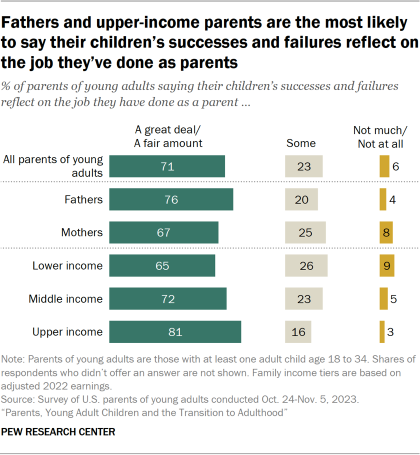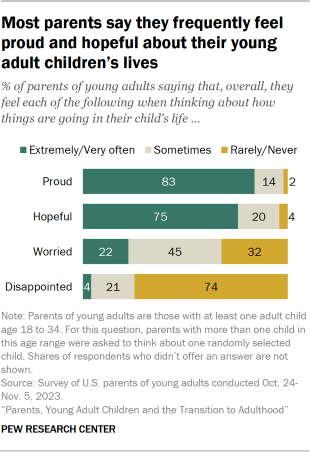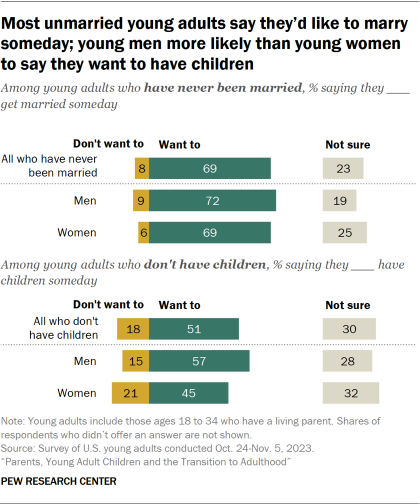This chapter looks at how parents view their role in their young adult children’s successes and failures and how things are going in their children’s lives. It also explores how young adults are thinking about marriage and parenthood.
Among the key findings:
- Most parents say the successes and failures of their young adult children (those ages 18 to 34) reflect on the job they’ve done as parents. This view is most common among dads and parents with higher incomes.
- Parents have generally positive views of how things are going in their young adult children’s lives. Most say they feel proud (83%) and hopeful (75%) extremely or very often. Far smaller shares say they frequently feel worried (22%) or disappointed (4%).
- 69% of young adults who have never been married say they want to get married someday. A smaller share of those who aren’t parents (51%) say they want to have children someday. Most of those who aren’t married or don’t have children say they don’t feel pressure from their parents to achieve these milestones.
How parents see their role reflected in their children’s successes, failures

Most parents (71%) say the successes and failures of their young adult children reflect on the job they’ve done as parents at least a fair amount, with 35% saying they do so a great deal.
Fathers (76%) are more likely than mothers (67%) to say their young adult children’s successes and failures reflect the job they’ve done as a parent a great deal or a fair amount. Still, majorities of both say this is the case.
These assessments also vary by income. About eight-in-ten parents with upper incomes (81%) say their young adult children’s successes and failures reflect on them as parents at least a fair amount. This compares with 72% of parents with middle incomes and 65% of those with lower incomes.
How parents feel about how things are going in their children’s lives

The survey asked parents how they feel things are going in the lives of their young adult children. For this question, parents with more than one child in the 18-to-34 age range were asked to think of a specific child (who was randomly selected) when answering these questions.4
Parents generally feel positive about how things are going in the lives of their young adult children. Most say they feel proud (83%) and hopeful (75%) extremely or very often.
Far smaller shares say they frequently feel worried (22%) or disappointed (4%). Still, 67% say they feel worried and about a quarter (26%) feel disappointed at least sometimes.
For the most part, mothers and fathers give similar answers to these questions. But mothers are more likely than fathers to say they feel worried at least sometimes (70% vs. 63%).
Those answering about a child age 18 to 24 are more likely than those answering about an older adult child to say they worry at least sometimes about how things are going in their child’s life (75%, compared with 66% of those answering about a child 25 to 29 and 59% of those answering about a child 30 to 34).
The shares of parents who feel hopeful, proud and disappointed at least sometimes don’t vary based on the child’s age. Parents’ views, including the extent to which they worry, also don’t vary based on whether they were answering about a son or a daughter.
Parents’ feelings about how things are going in the lives of their young adult children vary by a difference of 6 to 18 percentage points based on whether their children have or have not achieved certain milestones.
For example, parents are more likely to say they frequently feel proud and hopeful if the child they are answering about:
- Is married
- Is employed
- Has a four-year college degree or is currently enrolled in a four-year college
- Is completely or mostly financially independent
In turn, parents are more likely to say they feel worried and disappointed at least some of the time when answering about a child who has not achieved the milestones above.
How young adults feel about marriage and parenthood

The survey asked young adults ages 18 to 34 who have never been married and who don’t have children whether they would like to do these things in the future.
- 69% of young adults who have never been married say they want to get married someday.
- 51% of young adults who don’t have children say they want to have children someday.
Among those who don’t have children, young men (57%) are more likely than young women (45%) to say they want to have children in the future. There is no difference by gender in the shares of never-married young adults who say they would like to get married.
Do young adults feel pressured to get married or have children?
For the most part, young adults who have a living parent don’t feel much pressure or any pressure at all from their parents to get married or to have children.
- 73% of those who have never been married say they don’t feel pressured to get married.
- 67% of those who aren’t parents say they don’t feel pressured to have kids.
Similar majorities of young men and women say they don’t feel much pressure or any pressure at all from their parents to get married or have children. And answers don’t vary across age groups.




